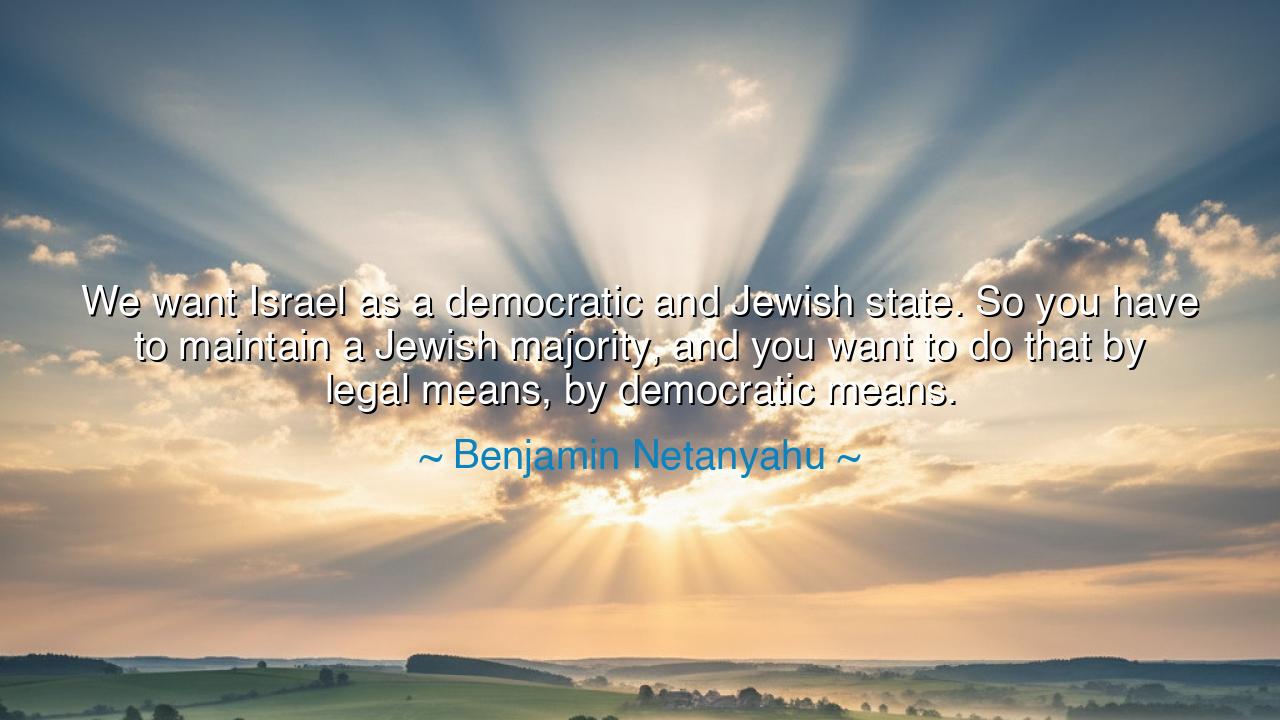
We want Israel as a democratic and Jewish state. So you have to
We want Israel as a democratic and Jewish state. So you have to maintain a Jewish majority, and you want to do that by legal means, by democratic means.






Hear the solemn words of Benjamin Netanyahu: “We want Israel as a democratic and Jewish state. So you have to maintain a Jewish majority, and you want to do that by legal means, by democratic means.” These words echo with the weight of history, for they speak to a people who, after centuries of exile and persecution, sought not only safety but identity, not only survival but sovereignty. Yet they also reveal the tension at the heart of nations: how to preserve a particular heritage while upholding the universal promise of democracy.
The meaning of this quote rests upon a delicate balance. Democracy proclaims equality, granting all citizens the same rights, regardless of faith or origin. Yet a Jewish state, by its very nature, seeks to preserve the heritage, culture, and destiny of the Jewish people in their ancient homeland. Netanyahu acknowledges this paradox: to remain both democratic and Jewish, Israel must strive to maintain a Jewish majority, but it must do so not through force or tyranny, but through the honorable path of law and democratic choice.
History shows us how fragile such balances can be. Consider the story of ancient Athens, the birthplace of democracy. The Athenians cherished their freedoms, yet they also restricted citizenship to a chosen people, excluding foreigners, slaves, and women. Their democracy was real, but limited. Over time, this tension weakened their city, for the ideals of equality could not forever be confined to the few. So too, Israel faces a similar test: to maintain its Jewish identity while ensuring that democracy is not diminished, but strengthened.
The origin of Netanyahu’s words is bound to the long memory of Jewish suffering. From Babylon to Rome, from Spain to Russia, the Jewish people lived as minorities, vulnerable to exile, pogrom, and persecution. The birth of Israel in 1948 was a triumph of return and self-determination. But with that triumph came responsibility: to build a homeland that honors Jewish history while also offering justice to all who dwell within its borders. Thus, the call to maintain a Jewish majority is not only political—it is existential, born from the fear that without it, the people may again be scattered or diminished.
Yet history also offers examples of the dangers of exclusion. The fall of South Africa’s apartheid regime reveals how attempts to preserve a racial or cultural dominance by law eventually crumbled under the weight of injustice. The lesson here is clear: if democracy is sacrificed in the pursuit of identity, the state may survive in name but lose its soul. If, however, identity and democracy can be harmonized, then a nation may flourish in both strength and legitimacy. Netanyahu’s words, therefore, are not only a statement of policy but a challenge: can Israel hold fast to both its Jewish character and its democratic ideals without betrayal of either?
The lesson for us is timeless: every nation must ask itself how to balance identity with inclusivity. A people without identity becomes rootless, drifting without purpose. But a people without inclusivity becomes rigid, brittle, and unjust. True strength lies in finding a path where heritage is preserved without denying dignity to others. For the greatness of a nation is not only in whom it protects, but in how it treats those who are different.
Practical action begins with vigilance. Laws must be crafted carefully, not to oppress but to sustain. Leaders and citizens alike must remember that democracy is not merely majority rule, but also the protection of minorities, the rule of law, and the respect for human dignity. If Israel—and indeed any nation—seeks to endure, it must ensure that its pursuit of identity is tempered by justice, its pursuit of majority tempered by mercy.
Thus let Netanyahu’s words be remembered as both proclamation and warning. To be both Jewish and democratic is no easy task—it is a burden heavy with history and alive with consequence. But if carried wisely, it can become a light to the nations: proof that a people can remain true to its ancient soul while still embracing the universal promise of freedom and equality for all.






AAdministratorAdministrator
Welcome, honored guests. Please leave a comment, we will respond soon